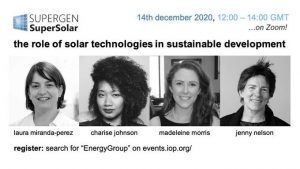Solar energy is an increasingly important aspect of the UK energy equation. From a cost perspective, it already rivals onshore wind, but has the capacity to be more widely implemented across utility, community and domestic settings. With plans to install a further 10 GW of utility scale solar across the UK already in the pipeline, dialogue between researchers, policy makers and the broader renewables community is increasingly important in order to ensure that we reach ‘Net Zero’ as quickly as possible.
What is clear is that we will not achieve Net Zero in science labs alone. The trust, advocacy and leadership required to overcome current barriers towards greater uptake of solar can only be achieved through collaboration and meaningful partnerships. This means that a far more diverse array of expertise is essential, encompassing such fields as policy analysis, economics, communications and societal analysis.
With this in mind, the Supergen SuperSolar Hub is launching a webinar series to explore the role of solar technologies in sustainable development. The webinar series will bring together speakers from diverse fields to explore how solar technologies can contribute to realising net-zero carbon emissions, addressing technological challenges, while promoting valuable dialogue between scientists, governing bodies and the public.
The SuperSolar Hub is an inclusive interdisciplinary solar community that bridges academic and industrial research. Led by Loughborough University, SuperSolar comprises the Universities of Bath, Cambridge, Liverpool, Oxford, Sheffield, Southampton, Swansea, Warwick and Imperial College London. SuperSolar is part of the EPSRC SUPERGEN programme, which represents the UK Government’s biggest investment in low-carbon energy research. As a research network that is primarily focussed on the development of novel photovoltaic materials and device architectures, SuperSolar events generally highlight cutting-edge research that is perhaps considered to be some way from everyday reality. But with the lofty targets for Net Zero, renewables research that gets shared and reported in a vacuum is no longer good enough. The targets for Net Zero accelerate the need for meaningful, systematic change; from research labs to government officials, helping the public understand, engage with and rethink their energy demands. As solar energy solutions become more widely available, they must be accessible for architects, city planners and economists.
The session was chaired by Dr Jess Wade, Research Fellow at Imperial College London, currently working on chiral materials for next generation devices. Alongside her research, Jess has a growing reputation as a science communicator and diversity champion, writing Wikipedia biographies of women and people of colour scientists every single day.

The first webinar of the SuperSolar series brought together the leaders in climate policy, community partnerships, academic research, and technology development. Dr Laura Miranda Perez, Head of Materials Research at Oxford PV Ltd, showed just how quickly promising new materials can become part of the future of solar, describing how perovskite materials have made the journey from promise to realisation in less than ten years. Oxford PV are currently preparing to roll out commercialisation of their perovskite-on-silicon tandem solar cell, which could dramatically improve solar module efficiencies. Charise Johnson, Policy Advisor at the British Academy, described how scientists will need to consider new ways of engaging with policymakers and the public in order to gain trust and drive momentum for widespread use of solar technologies. Johnson described how scientists can use professional bodies as routes for engagement with government and policy makers, accessing the skills of artists and other creatives to effectively communicate their message. Professor Jenny Nelson, Imperial College London, described how pure scientific research can be translated to the real world. Nelson is a world-leading researcher in photovoltaics who, alongside studying energy materials, has created computational models to identify the best solutions to energy supply paradigms. Her technologies are currently being implemented in developing communities. Dr Madeleine Morris, The Grantham Institute for Climate Change at Imperial College London, discussed the importance of solar in developing smart energy systems. She highlighted that to impact policy and legislation, scientists and climate advocates can engage with citizen assemblies.
The audience reaction to our first webinar highlighted that early career researchers are increasingly motivated to move to a fully energy renewable society and acknowledge the need to engage beyond the research community.
Further events in the series are being planned, with an overarching goal of broadening the purview of researchers in solar technologies to encompass by showcasing the full diversity of skill sets and backgrounds that overlap during the pathway to ensuring that solar becomes an ever increasingly significant part of the global energy resource, ensuring that the Net Zero target can be fully realised.
Register for the second event in the series on 29th March 2021 here.
